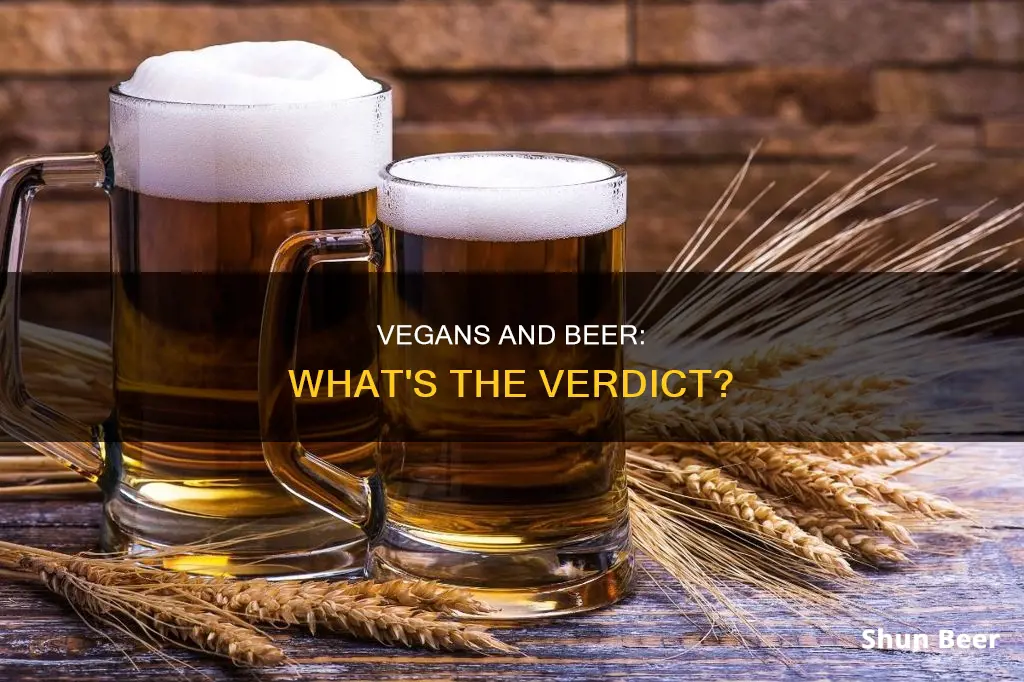
Vegans, rejoice! Most beers are vegan-friendly. The basic recipe for beer is all plant-based, and some of the world's biggest beer brands, including Budweiser, Coors, and Heineken, are suitable for vegans. However, vegans should be aware that some beers are made using animal products. Animal-derived ingredients can be used during processing, and brewers are not required to list these on their labels. These ingredients include honey, lactose, milk, and eggs, as well as fining agents such as isinglass (derived from fish bladders) and gelatin. So, while vegans can drink beer, they may need to do some research first.
| Characteristics | Values |
|---|---|
| Animal products used in beer | Honey, lactose, isinglass, gelatin, whey, casein, milk, eggs, cochineal, chitin |
| Vegan beers | Corona, Budweiser, Guinness, Coors, Miller, Heineken, Sierra Nevada, Blue Moon Belgian White, Golden Road Point the Way IPA, Anderson Valley Brewing Barney Flats Oatmeal Stout, Lagunitas Brewing Company IPA, Firestone Walker Brewing Company Union Jack IPA, Ommegang Witte Wheat Ale, North Coast Brewing Co. Old Rasputin Russian Imperial Stout, Widmer Brothers Hefe, Abita (except Honey Rye Ale), Big Sky Brewing (except Summer Honey), Coors Light, Corona Light, Miller High Life, Rogue Chocolate Stout & Hazelnut Brown Nectar, Stella Artois (beer only), Asahi, Dos Equis, Keystone, Kirin, Modelo, Negra Modelo, Newcastle, Pacifico, Samuel Adams Boston Lager, Yuengling |
| Non-vegan beers | Foster's, Red Stripe (when brewed in Jamaica), Cask ales, Honey beers, Meads, Milk stouts |
| Websites to check vegan status of beers | Barnivore |
What You'll Learn

Common non-vegan ingredients in beer
While beer is primarily made from barley malt, water, hops, and yeast—all vegan-friendly ingredients—some brewers add finings that are not vegan. These finings are used to clarify the beer before bottling, kegging, or canning, and can be derived from animal products. Here are some common non-vegan ingredients found in beer:
Isinglass
Isinglass is a type of gelatine derived from the swim bladders of tropical or subtropical fish, most commonly sturgeon. It is used to make beer clear and is a traditional fining agent in British cask ales, also known as real ales. Isinglass is not always listed on the beer label, and some companies produce both vegan and non-vegan brews, so it is best to check with the manufacturer if you are unsure.
Gelatin
Gelatin is obtained by boiling the skin, tendons, ligaments, and bones of animals. It is added to beer to act as a clarifying agent, giving the beer a clear and smooth appearance. Like isinglass, gelatin may be difficult to detect in beer, so it is advisable to research the brewing process or contact the manufacturer directly.
Glycerin or Glycerol Monostearate
Glycerin can be derived from plant oils or animal fats, and beer labels often do not specify the source. Animal-derived glycerin, sometimes called tallow, comes from beef or mutton fat. Glycerol monostearate is another animal product that may be used in the later stages of beer processing to create a foam or head on the finished beer.
Casein
Casein is a milk ingredient that is sometimes used in the fining process of beer production. It is not always listed on the label, but many people have a casein allergy, so it may be highlighted as an allergen.
Honey
Honey is added to some beers for flavouring and sweetness. While it is generally considered suitable for vegetarians, honey is an animal product and therefore not vegan. Honey beers, mead, and braggot are examples of beverages that are not vegan-friendly.
Lactose
Lactose is a sugar derived from milk and is sometimes added to beers, particularly milk stouts. Chocolate stouts and other flavoured beers may also contain lactose, so it is important to read labels carefully.
Yorkshire Terriers and Alcohol: What's Safe?
You may want to see also

Vegan-friendly beers
Most beers are vegan-friendly, but some use animal products in their production process, so it's important to check. Here are some tips for identifying vegan beers:
- Check the label – While it's not mandatory, some beers will include vegan symbols or text on the label.
- Look for allergen statements – Milk, eggs, fish, and shellfish are common allergens, and companies may voluntarily list these ingredients.
- Use online resources – Websites like Barnivore provide directories of vegan beers.
- Contact the manufacturer – If you're still unsure, the most reliable way to determine if a beer is vegan is to ask the manufacturer directly.
- Budweiser and Bud Light
- Coors and Coors Light
- Corona Extra and Corona Light
- Miller Lite, Miller High Life, and Miller Genuine Draft
- Heineken (beer only, not cider)
- Guinness (Original and Blonde American Lager only)
- Stella Artois (beer only, not cider)
- Pabst Blue Ribbon
- Sam Adams Boston Lager
- Sierra Nevada Pale Ale
- Sapporo Lager
- Kirin Lager
- Asahi Lager
- Labatt Blue
- Pilsner Urquell
While most mass-market beers are vegan, it's important to note that some beers are not suitable for vegans, including Foster's lager and beers with "honey" in the name. Additionally, some breweries produce both vegan and non-vegan beers, so it's always a good idea to check before consuming.
Jackfruit and Beer: A Risky Culinary Adventure?
You may want to see also

Why beer might not be vegan
While most beers are vegan, some are not due to the use of animal products in the brewing process. This can be a problem for strict vegans, who need to be aware of the possibility of non-vegan beers.
One reason why beer might not be vegan is the presence of lactose, a sugar derived from milk. Lactose is often found in milk stouts and some "smoothie" beers. Honey is another animal product that can be added to beer for flavouring or as a sweetener. Honey beers, for example, are unlikely to be vegan.
Another reason why beer might not be vegan is the use of animal-derived finings. Finings are substances used to filter out impurities and improve the clarity, flavour, and aroma of the beer. Isinglass, derived from fish bladders, is a common fining agent used in cask ales. Other non-vegan finings include gelatin, made from animal skin, bones, and cartilage, and glycerol monostearate, which is used to create a foam or head on the beer.
It is worth noting that many breweries do not disclose whether they use animal products in their beers, making it difficult for consumers to know for certain. However, some breweries, such as Guinness, have transitioned to using vegan-friendly filtration methods.
GABA and Beer: Is It Safe to Mix?
You may want to see also

How to tell if a beer is vegan-friendly
While most beers are vegan-friendly, some are not, and it can be tricky to tell the difference. Here are some ways to find out whether a beer is suitable for vegans:
Check the label
Although manufacturers are not required to list ingredients on alcohol labels, some companies use vegan symbols or text to indicate vegan status. Alternatively, look for allergen statements – milk, eggs, fish, and shellfish are common allergens and non-vegan ingredients.
Check the manufacturer's website
If you have a few favourite beers, check the brewer's website for information on their vegan credentials. If you buy from a craft brewery or small brewer, you may need to ask them directly.
Consult online resources
Websites like Barnivore list the vegan status of thousands of alcoholic beverages.
Look for common non-vegan ingredients
Animal products may be used during processing or as ingredients. Common non-vegan ingredients include milk, cream, whey, casein, lactose, honey, eggs, isinglass, gelatin, cochineal, and carmine.
Avoid certain types of beer
Cask ales, honey beers, and meads are unlikely to be vegan. Milk stouts usually contain whey or lactose, although vegan alternatives exist.
Beer and Pregnancy: Safe Drinking During Two-Week Wait?
You may want to see also

Ingredients and additives unsuitable for vegans
While the basic ingredients used to make beer are vegan, some breweries add extra ingredients or use manufacturing processes that are unsuitable for vegans.
Isinglass
Isinglass is a substance obtained from the dried swim bladders of fish, typically sturgeon. It is used in beer production as a fining agent to clarify the beer by removing yeast and other particles, resulting in a clearer appearance. Isinglass is often used in the production of cask ales, and was used in the brewing of Guinness until recently.
Gelatin
Gelatin is derived from animal collagen, often sourced from cow or pig bones, skin, and connective tissues. It is used as a fining agent in beer to help clarify the liquid by binding to particulate matter and yeast, aiding in their removal during filtration.
Albumin
Albumin is a protein derived from animal sources such as egg whites or blood serum. It is used as a foaming agent in beer production to improve the stability and texture of the beer's foam head.
Casein
Casein is a protein found in milk and dairy products. In beer production, it is occasionally used as a fining agent to clarify the beer by binding to suspended particles and yeast, aiding in their precipitation and removal.
Lactose
Lactose is a sugar derived from milk. While not commonly used in traditional beer production, lactose may be added to certain styles of beer, such as milk stouts, to impart sweetness and creaminess to the finished product.
Honey
Honey is a natural sweetener produced by bees from flower nectar that is used to flavour beer or to form the basis of mead or honey ales.
Chitosan
Chitosan is a polysaccharide derived from the shells of crustaceans such as shrimp and crabs. It is sometimes used in beer production as a fining agent to help clarify the beer by binding to yeast and other particles, facilitating their removal during filtration.
Whey
Whey is a protein-rich liquid that is separated from milk during the cheese-making process. While not a common ingredient in traditional beer production, whey may be used in certain beer styles to give a creamy texture to the finished product
Beer and Metro North: What's Allowed?
You may want to see also
Frequently asked questions
The short answer is "usually yes". Beer is often made from barley malt, water, hops and yeast, so it is frequently suitable for vegans. However, some brewers add finings to clarify the beer, which can include animal-derived products such as isinglass and gelatin.
Beers that are not vegan-friendly include Cask Ales (or Real Ales), which often use isinglass as a fining agent, and milk stouts, which usually contain whey or lactose. Honey beers are also unlikely to be vegan, as they use honey for added sweetness and flavour.
Some popular beers that are vegan-friendly include Budweiser, Bud Light, Coors, Coors Light, Corona Extra, Corona Light, Miller Lite, Miller High Life, Heineken, Guinness (since 2016), Sierra Nevada Pale Ale, and Stella Artois (beer only, not cider).
It can be difficult to find out whether a beer is vegan or not, as manufacturers are not required to list ingredients on beer labels, and companies rarely list fining agents. However, some companies use vegan symbols or text to indicate vegan status on the label. You can also use online resources such as Barnivore to look up the vegan status of a beer, or contact the manufacturer directly.







